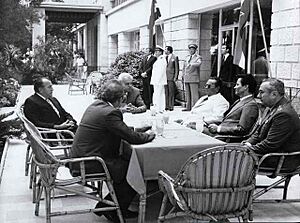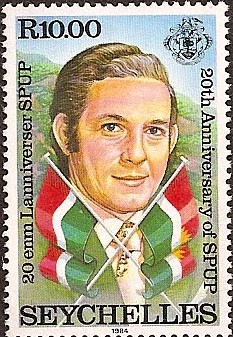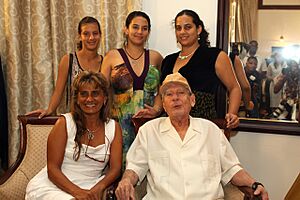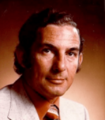France-Albert René facts for kids
Quick facts for kids
France-Albert René
|
|
|---|---|
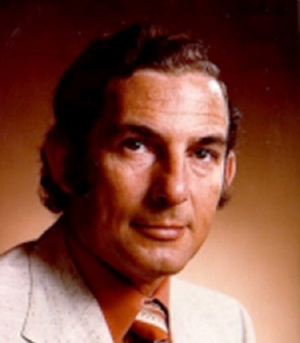 |
|
| 2nd President of Seychelles | |
| In office 5 June 1977 – 14 July 2004 |
|
| Vice President | James Michel (1996–2004) |
| Preceded by | James Mancham |
| Succeeded by | James Michel |
| 2nd Prime Minister of Seychelles | |
| In office 29 June 1976 – 5 June 1977 |
|
| President | James Mancham |
| Preceded by | James Mancham |
| Succeeded by | Position abolished |
| Personal details | |
| Born | 16 November 1934 Victoria, Seychelles |
| Died | 27 February 2019 (aged 84) Mahé, Seychelles |
| Political party | Seychelles People's Progressive Front |
| Spouses | Karen Handley (1956) Geva Adam (1974) Sarah Zarquani (1992) |
| Alma mater | King's College London |
| Profession | Lawyer, politician |
| Signature | |
France-Albert René (born 16 November 1934 – died 27 February 2019) was an important leader from the Seychelles. He was a lawyer and politician who became the second President of Seychelles from 1977 to 2004. Before that, he served as the country's second Prime Minister from 1976 to 1977, right after Seychelles became independent.
People in Seychelles, especially government officials and his party members, often called him "the Boss." He was also known simply as Albert René or F.A. René, and sometimes by the nickname Ti France.
Contents
Early Life and Education
France-Albert René was born on 16 November 1934, in Victoria, on the island of Mahé, which was then a British colony called the Crown Colony of Seychelles. His father, Price René, managed a plantation, and his mother, Luisa Morgan René, was a seamstress. He spent his early childhood on Farquhar Island.
When he was five years old, his family moved back to Victoria. He attended St Joseph’s Convent and later St Louis College. Thanks to scholarships, he was able to continue his studies. In 1952, at age 17, he received a scholarship to study theology in Switzerland. However, in 1954, he switched to law, studying in England at St. Mary's College, Southampton, and then at King's College London.
In 1957, he became a qualified lawyer. While studying abroad, he became very interested in politics, especially with the Labour Party in the UK. This experience shaped his ideas, leading him to believe in a moderate form of socialism, which meant the government should help guide the economy. He also believed in strong ties with groups like the Catholic Church, even though he later disagreed with some church leaders in Seychelles. From 1962 to 1964, he also studied economics at the London School of Economics.
When he returned to Seychelles in 1964, he started practicing law in Victoria. He was unhappy with how the British colonial government treated people, which he felt caused a lot of unfairness. Because of this, he decided to get involved in his country's political future. He also started a newspaper called The People.
Starting in Politics
New political groups began to form in Seychelles in 1964. One of these was the Seychelles People's United Party (SPUP), which France-Albert René helped create. This party pushed for socialism and for Seychelles to become independent from Britain. At the same time, another party, the Seychelles Democratic Party (SDP), was formed by James Mancham. This party represented business owners and wanted Seychelles to stay closer to Britain.
René was elected to the colony's legislative assembly in 1965. He and his party worked hard for Seychelles to gain self-government and then full independence. In 1970, Seychelles got a new constitution and the right for all adults to vote.
In 1975, René became the Minister of Public Works and Land Development in a government that included both his party and the Democratic Party. After more talks with the British, Seychelles became an independent republic within the Commonwealth on 29 June 1976. Sir James Mancham became the first President, and France-Albert René became the Prime Minister. During these talks, some islands that had been taken from Seychelles to form part of the British Indian Ocean Territory were returned.
The 1977 Change in Leadership
Less than a year after Seychelles became independent, a big change happened. On 4–5 June 1977, while President James Mancham was away at a meeting in London, supporters of France-Albert René took control in a peaceful takeover. René then became the new President.
When René became President, he said he was not a "Soviet-style Communist." Instead, he called himself an "Indian Ocean socialist" and a "socialist pan-Africanist." He wanted to make sure that the benefits of Seychelles stayed with its people. He also didn't want the country to rely too much on tourism.
Building a New Nation
Changes in Seychelles
René's party, which changed its name to the Seychelles People's Progressive Front (SPPF) in 1978, was the only legal political party from 1979 to 1991. During this time, the president was chosen by a simple yes-no vote, and the president had a lot of power.
Under René's leadership, the SPPF made many important changes. They made sure everyone had access to education and healthcare. They also worked on protecting the environment. Compared to many other countries in Africa, Seychelles improved a lot in areas like child health, how many people could read, and general living standards. During this period, Seychelles became one of the most developed countries in Africa. The lives of the Seychellois Creole people, who are the majority, also got much better.
International Relationships
Seychelles built relationships with many countries during René's time as leader.
- China: Diplomatic ties with China started in 1976. China helped Seychelles by building a poly-technical school and housing projects.
- India: Seychelles and India have had friendly relations since 1976. Leaders from both countries visited each other often.
- Malaysia: Seychelles looked to trade directly with Malaysia to get products without going through other countries.
- North Korea: Seychelles had close ties with North Korea, receiving aid and military cooperation. René visited North Korea several times.
- Soviet Union: Relations with the Soviet Union began in 1976. Seychelles supported the Soviet Union's actions in Afghanistan.
- United States: The U.S. had a tracking station in Seychelles from 1963 to 1996. The U.S. Embassy in Seychelles closed in 1996, and a smaller consular agency was opened.
Challenges to Leadership
During the 1980s, there were several attempts to overthrow René's government.
- In November 1981, a group of mercenaries, led by a British colonel named "Mad Mike" Hoare, tried to take over the country. They pretended to be tourists, but airport security found a weapon. There was a gunfight, and some mercenaries escaped by hijacking a plane.
- In August 1982, there was a small army rebellion, but it was stopped quickly by loyal troops and help from Tanzania.
- In 1986, the Seychelles Minister of Defence, Ogilvy Berlouis, tried to lead a coup. President René asked India for help, and an Indian naval ship arrived to prevent the takeover. India also helped René return to Seychelles safely during another attempted coup later that year.
These attempts showed that René kept a strong hold on the islands. He also used Seychelles' important location to get help from powerful countries without having to fully side with either of them during the Cold War.
Return to Democracy
As the world changed in the early 1990s, and with pressure from countries that provided aid, René's government began to move towards a more democratic system. In December 1991, President René announced that Seychelles would return to a system with multiple political parties after almost 16 years of one-party rule.
Many people who had left Seychelles during the one-party rule, including former President James Mancham, returned home. By April 1992, eight political parties had registered. A new constitution was drafted and approved by voters in 1993.
The first multi-party presidential and legislative elections since 1974 were held in July 1993. President René and his SPPF party won these elections. He continued to win elections in 1998 and 2001. In 2004, he proudly stated, "I trust that when you walk across our islands, you’ll conclude that I have done my duty as a Seychellois worker.”
Stepping Down and Later Life
On 24 February 2004, France-Albert René announced that he would step down as President. His Vice-President, James Michel, took over on 14 July 2004. René remained the leader of his party, the People's Progressive Front. Even after he left office, René was still very influential in Seychelles politics, earning him nicknames like "Kingmaker" and "the Boss."
France-Albert René passed away on 27 February 2019, in Mahé, Seychelles, at the age of 83, due to breathing problems. Then-President Danny Faure announced his death, calling René the "modern-day architect of Seychelles." He received a state funeral and was buried at State House.
Many people remembered him as a true leader who fought for independence and had a great vision for Seychelles. Chinese President Xi Jinping sent his condolences, calling René an "old friend of the Chinese people" who helped build friendship between China and Seychelles.
Personal Interests
France-Albert René was very proud of his rich Creole culture and encouraged the people of Seychelles to develop it further. He often spoke about his childhood on the islands and kept habits like fishing and eating traditional Creole food throughout his life.
What People Remember
For a long time, France-Albert René was seen as a leader who helped his country become one of the most developed in Africa. His supporters point to his government's focus on education, healthcare, and the environment. Important measures like child mortality rates and literacy rates improved greatly during his time. Seychelles also avoided the political problems seen in some nearby island countries.
However, after 2018, a commission was set up to look into past events. This commission heard stories from people who said they had been treated unfairly, or whose relatives had been harmed, during his rule. Critics believe that his government was responsible for human rights issues involving people who opposed the government. Many Seychellois left the country during his rule due to political concerns. Some critics also point to issues of corruption during his time in power.
Despite these different views, France-Albert René is remembered as a very important figure in the history of Seychelles.
Images for kids
See also
 In Spanish: France-Albert René para niños
In Spanish: France-Albert René para niños
 | Mary Eliza Mahoney |
 | Susie King Taylor |
 | Ida Gray |
 | Eliza Ann Grier |


